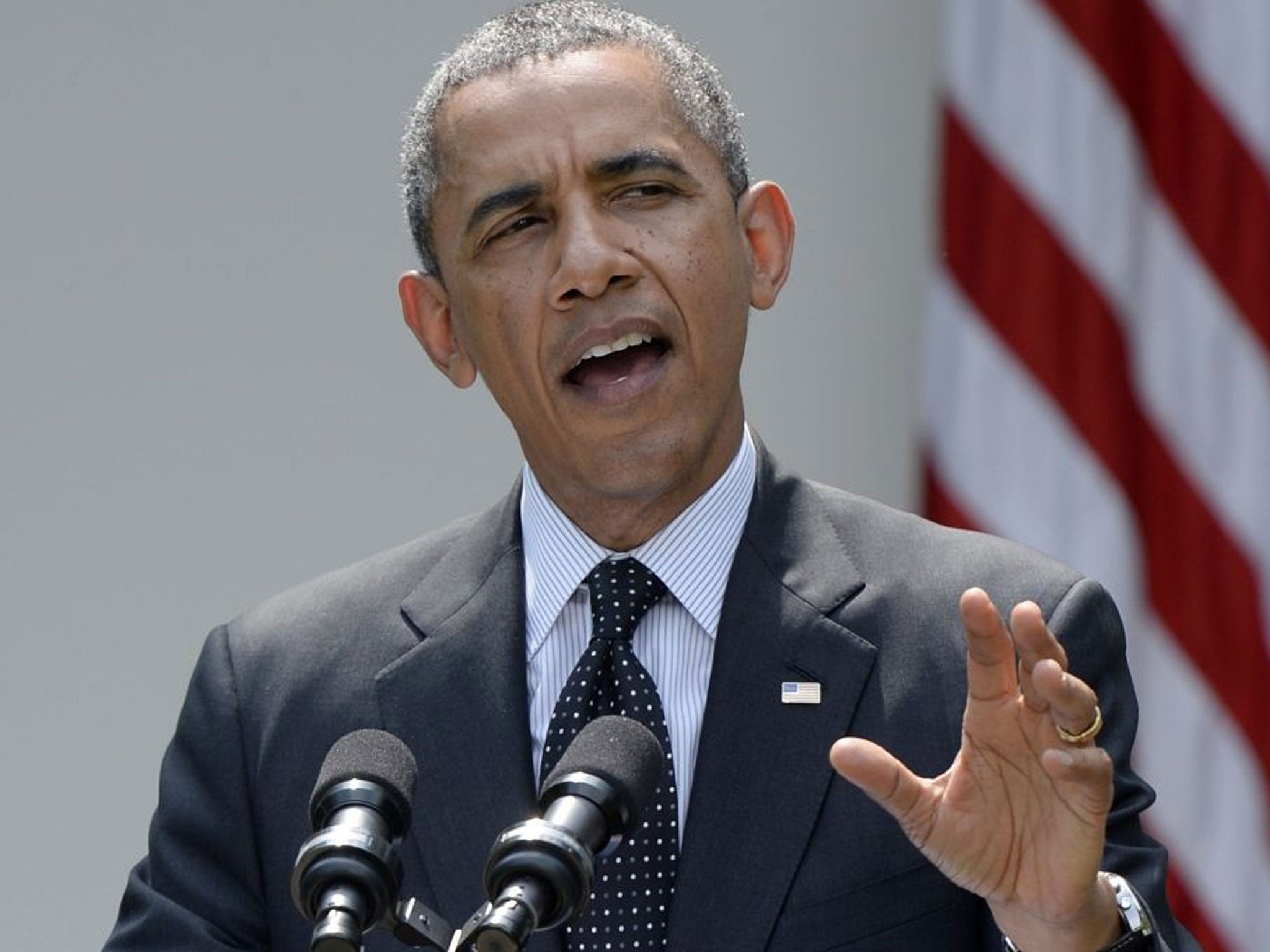Welcome to the age of post-interventionism
Military intervention in other countries is not the only way for America to show its strength


Hard though it is to believe, less than halfway into his second term, Barack Obama is being forced to defend the foreign policy that was a key to his elevation to the White House: his turn away from the application of hard, military power, towards “softer” and “smarter” ways of winning friends and influencing people.
More than two years after the last US troops left Iraq - on time to honour his election promise, and with mere months before the last combat troops leave Afghanistan - President Obama felt the need to set out the thinking behind his foreign policy all over again, telling new graduates at West Point military academy that fewer of their number should see combat in future, and fewer would lose their lives.
It was not entirely clear from his reception – either in the hall or in Washington political circles – how welcome his assurance was. So closely has US power been associated with military superiority, so precisely has US military reach been equated with global leadership, that anything else seems to cause apprehension and talk of dangerous US weakness. Scarcely a week has gone by in the past six months without Republicans, and even some on Obama’s own side, claiming that a perilous vacuum has been created by what appears to many the President’s reluctance to lead.
But what would his critics prefer, you want to ask: a return to George W. Bush and the impetuous use of American military power that caused so many deaths, cost so much money and left American voters tired after a decade of foreign wars? Were there places where the US should have fought, on Obama’s watch, but did not – and in so NOT doing, left the United States exposed? It is military defeats - or at least non-victories, such as Iraq and Afghanistan – that speak of weakness, not judicious abstention.
In his speech, Obama addressed three areas in particular where he has been condemned for not acting, or at least not in the way his critics would like. One is Iran – where he (and many others) are still banking on a breakthrough in the nuclear talks, but where, in the eyes of some, he appeared weak by rejecting the use of force. There is Syria, where Obama said - I think for the first time so categorically - that he judged it unwise to intervene militarily. And, most recently, Ukraine, where he insisted that the Cold War was over, military intervention would serve no purpose, and Russia had to be brought around to accepting a sovereign Ukraine by other means.
Obama is right on all these scores, but his call for the US to act unilaterally only where its own security is directly threatened and otherwise act through international coalitions (an echo of Bill Clinton’s foreign policy) leaves him looking, to many Americans, almost wimpishly “European”. What is military power for, they badger him, if the President declines to use it as a statement of American strength?
Obama offered a different definition of strength – “Our economy remains the most dynamic on Earth; our business the most innovative. Each year we grow more energy independent. From Europe to Asia, we are the hub of alliances unrivalled in the history of nations. The values of our founding fathers inspire leaders in parliaments and new movements in public squares around the globe.” Directly on the military question, he said that not every problem has a military solution. Iraq, Afghanistan and now Libya surely furnish the living proof.
As it happened, London’s leading military think tank, the Royal United Services Institute, chose this week to publish a collection of essays, Wars in Peace, looking at Britain’s military operations since 1991. While not entirely dismissive of the UK’s role in foreign interventions – this is a military organisation, after all – the book describes the wars in Iraq and Afghanistan as “costly failures” which took large amounts out of the country’s coffers without producing much, if anything, in return. It reserved judgement on the intervention in Libya, while hailing the Balkans and Sierra Leone as successes.
Like Obama, the RUSI assessment is that multinational cooperation and an international mandate are preferable, where intervention in third countries is concerned. Unlike Obama, however, the military men seemed to hint that opinion might come full circle and a taste for late 20-century intervention might return. Even though they admitted that the UK’s finances might not stretch that far, there seemed to be a distant hope that more money might be found.
“I would betray my duty to you,” said Barack Obama to the US troops of tomorrow, “if I sent you into harm’s way... because I was worried about critics who think military intervention is the only way for America to avoid looking weak.” It would be good to hear a similar sentiment from our own leaders.
Another Lord High Everything
No sooner has Lord Patten (ex-governor of Hong Kong, ex-European commissioner, ex-Conservative minister, current Chancellor of Oxford University) stepped down as chairman of the BBC Trust for health reasons, than another Lord High Everything is pole-vaulted into the frame. Lord Coe - he of multiple Olympic golds (Moscow 1980, Los Angeles 1984, London 2012), ex-Conservative MP and chairman of the British Olympic Association, is being mentioned as a possible successor.
I have nothing whatever against Lord Coe (except that my brother used to run against him way back in schools cross-country, and Seb always won). And there may be merit in appointing someone distinguished from outside the in-bred BBC “family”. But why is the circle of those considered for top jobs in the UK so limited? Are there no more winsome Canadians out there?
Join our commenting forum
Join thought-provoking conversations, follow other Independent readers and see their replies
Comments
Bookmark popover
Removed from bookmarks